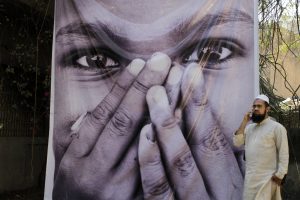The Bharatiya Janata Party (BJP) government’s effort to rewrite Indian history is gathering momentum once again. Key periods and events in India’s history that are unpalatable to its Hindutva ideology and anti-Muslim mindset are being deleted from history and political science textbooks of Grade 12 students in India.
This is the third time since the BJP came to power in 2014 that the government is undertaking a textbook revision exercise; its previous textbook revisions were in 2017 and 2019.
Among the deleted sections is an entire chapter on the Mughals, a Muslim dynasty that ruled India for 200 years and the discussion of the pursuit of Hindu-Muslim unity by India’s founding father Mohandas Karamchand Gandhi. The Brahmin origin of Gandhi’s assassin Nathuram Godse and the brief bans imposed on the Rashtriya Swayamsevak Sangh (RSS), the ideological mentor of the BJP, have been conveniently deleted as have the communal riots in Gujarat of 2002.
Incidentally, all these episodes and events in India’s history are facts that Hindutva groups and their sympathizers want erased from public memory. Deeply Islamophobic, they hold Marxist historians responsible for glorifying Mughal history.
In the nine years it has been in power, the BJP has incrementally rewritten India’s history to suit its ideological biases and remove “uncomfortable” facts from school textbooks.
The National Council of Educational Research and Training (NCERT), the authority in charge of writing textbooks has described the revision of content as a “syllabus rationalisation” exercise aimed at reducing the academic burden on students in the aftermath of the COVID-19 pandemic.
However, a closer examination of the topics that have been axed from the textbooks reveals that deletions are selective. “There is clearly no rationale for the present motivated deletions,” educationist Anita Rampal, a professor at Delhi University, said, pointing out that the government move is “contrary to a sound and scientific approach to teaching and learning, with serious implications for the development of our students.”
The revised textbooks will come into effect from the current academic year, 2023-24. NCERT textbooks are studied by students of the Central Board of Secondary Education and 23 other State boards across the country. Last year, I wrote about how these textbooks had raised a political controversy, when it was first notified by the NCERT. The current revision exercise seems to be the most sweeping.
Hailing the “great decision” to remove the chapter on the Mughals — what he describes as “false history,” BJP leader Kapil Mishra said, “Thieves, pickpockets and two-penny road raiders were called the Mughal Sultanate and the emperor[s] of India. Akbar, Babar, Shah Jahan, Aurangzeb are not in the history books, they are in the dustbin.”
Interestingly, the BJP’s pruning of history is clearly selective.
The revised NCERT textbook makes no mention of the 2002 riots in Gujarat which took place under BJP rule and when Prime Minister Narendra Modi was Gujarat’s chief minister. While NCERT dropped content on the Gujarat riots, discussion of the anti-Sikh riots, which followed the assassination of Prime Minister Indira Gandhi in 1984 and occurred during Congress rule, has been retained. Rampal points out that, when the Congress party was in power it “did not attempt to censor or alter textbooks” that critiqued its actions and policies.
Particularly shocking is the deletion of text regarding Gandhi’s anti-communal stance and his assassination by the Hindu extremist Godse.
That “Gandhi was particularly disliked by those who wanted India to become a country for the Hindus, just as Pakistan was for Muslims…” and that Hindu extremists were provoked by Gandhi’s pursuit of Hindu-Muslim unity and “made several attempts to assassinate him” –- these sentences have been removed.
Incidentally, the NCERT avoided mentioning that it had deleted the above sentences; it was not included in the list of deletions that were made public. When questioned, NCERT Director D.P.Saklani claimed it was an “oversight” but made it clear that it won’t restore the changes.
Reacting to the controversial deletions from textbooks, Congress President Mallikarjun Kharge said that the BJP-RSS may change textbook content but “they cannot erase history. “
Explaining the BJP government’s “saffronisation of textbooks,” Kerala Chief Minister Pinarayi Vijayan, a communist, said: “The Sangh Parivar lives in constant fear of history as it exposes their true colours. They resort to rewriting history and masking it with lies.” The Sangh Parivar comprises the RSS and its affiliated organizations including the BJP.
Late on Friday night, eminent academicians like Romila Thapar and Jayati Ghosh, who have written previous versions of the NCERT textbooks issued a public statement demanding the withdrawal of the deletions. Describing the changes as guided by “divisive motives,” the statement said there was no attempt to consult those who had written the books. “It is a decision which goes against the constitutional ethos and composite culture of the Indian subcontinent,” it pointed out. “As such, it must be rescinded at the earliest.”

































